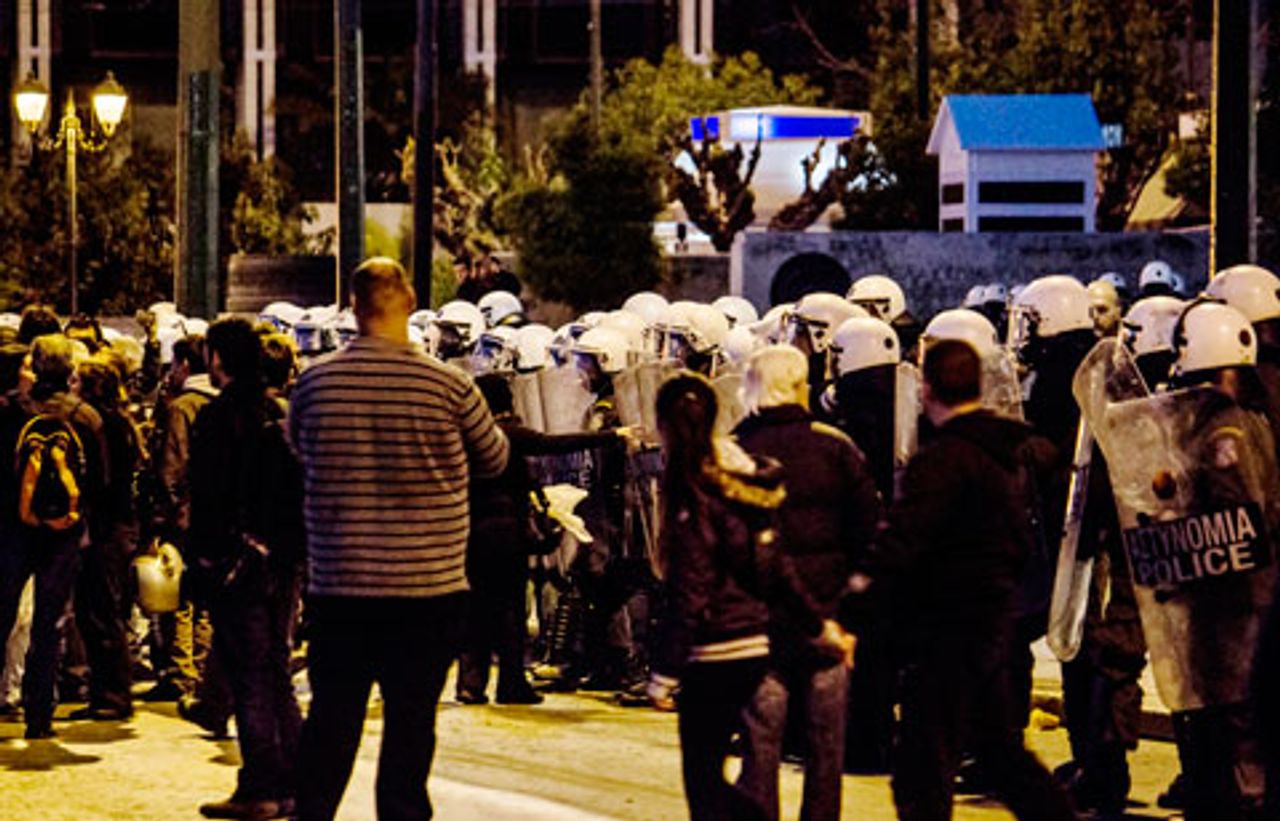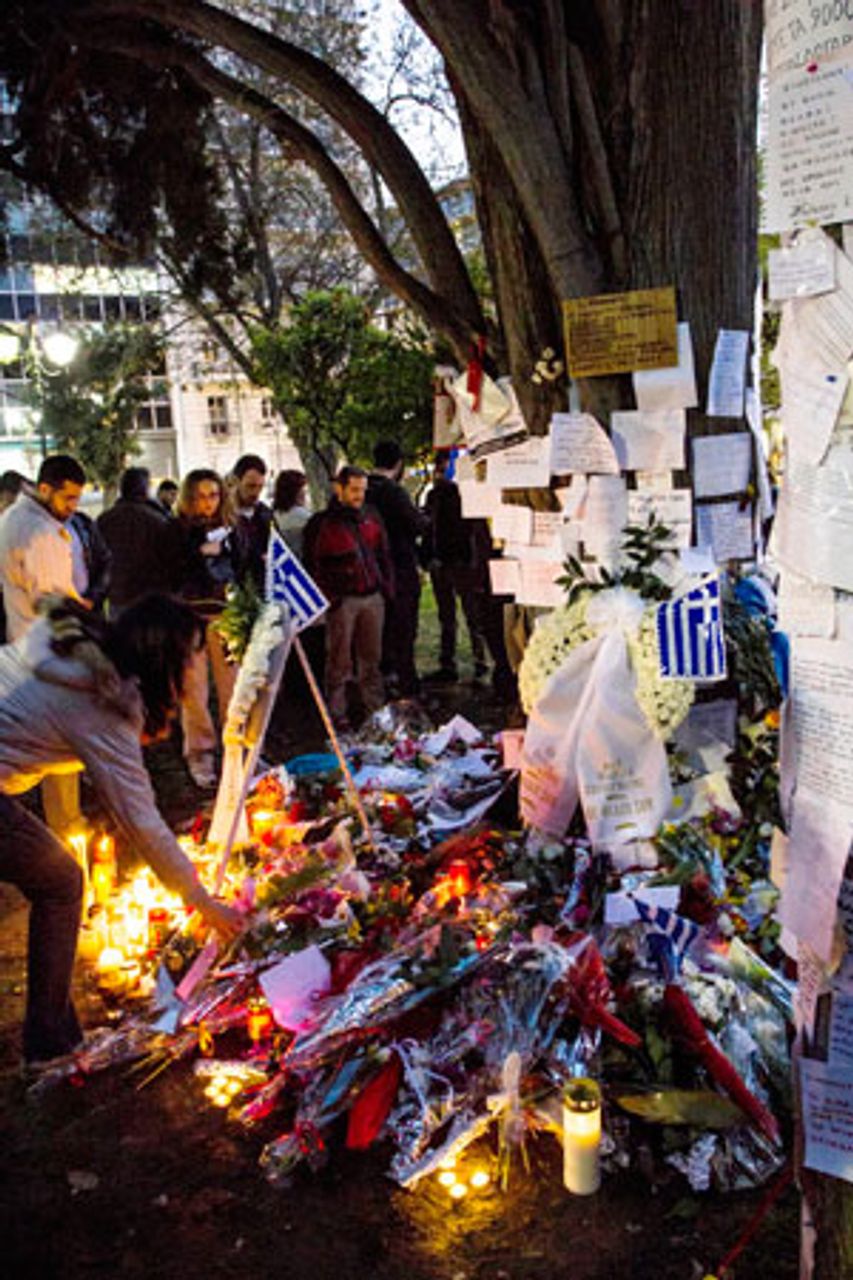Thousands of mostly young people have taken to the streets of Athens following the suicide of 77-year-old Dimitris Christoulas on Wednesday. They are protesting against the government’s draconian austerity policies, which have been dictated by the European Union and the International Monetary Fund. The police responded by brutally breaking up the demonstrations.
 Police dispersing protesters in front of the parliament building [Photo: Jack Zalium]
Police dispersing protesters in front of the parliament building [Photo: Jack Zalium] Christoulas killed himself with a handgun in Athens’ central Syntagma Square, in front of the Greek parliament where a series of brutal cuts packages have been passed in recent months. In a letter he explained that he preferred to take his life with dignity rather than end up scavenging through garbage looking for food. He urged young people to rise up against the government, which he compared to the puppet regime under Nazi occupation during World War II.
Thousands of young people assembled in Syntagma Square shortly after the announcement of Christoulas’ death. Some chanted that what had taken place was not a suicide, but a “murder perpetrated by the state.”
Many protesters left letters and flowers under the tree where Christoulas took his life. One note read, “Killed by the creditors’ dictatorship.” Another asked, “Who will be the next victim?”
The government and state forces reacted to the spontaneous protests with extreme brutality. The police used a few minor skirmishes as an excuse to proceed with truncheons and tear gas against demonstrators. Ten people were arrested and many injured on Wednesday.
 A tribute to Dimitris Christoulas in Syntagma Park
A tribute to Dimitris Christoulas in Syntagma Parkwhere he shot himself [Photo: Jack Zalium]
Hundreds of protesters who assembled at Parliament Square on Thursday were quickly dispersed by the police.
According to reports, the security forces have deliberately moved against journalists in order to prevent any reporting critical of the government crackdown. On Wednesday, a reporter for the Antena private television station was admitted to hospital following a beating by police. A journalist from the Net television station said he was also attacked by the police, although he had tried to identify himself as a journalist. “I fell from the sidewalk onto the road, but fortunately, unlike my colleague, I was not injured,” said Georgios Gerafentis.
On Friday, the union of photojournalists issued a statement saying that its members had been attacked in a “barbaric and unprovoked” manner. The chairman of the union, Marios Lolos, also ended up in hospital. Witnesses said he had been repeatedly beaten with clubs.
The union statement read: “The systematic and repeated attacks on members of the press doing their work violates basic human rights and cannot be regarded as random. Even the most naive person must acknowledge that they intend to gag the press.”
Dimitris Christoulas’ daughter, Emy Christoulas, said of her father, “The farewell letter from my father leaves no room for misinterpretation. He was a lifelong left-wing militant, a selfless visionary. His last act was a conscious political action in line with what he believed and did.”
Over the past few years Christoulas had participated in many protests against the austerity policies of the government. According to neighbours, he had hung a banner from his balcony with the slogan “I will not pay,” in support of a movement against the increase in taxes. One of his neighbours said that, “[H]e wanted to make a political statement with his suicide... He was very politicised, but also angry.”
Last summer, the pensioner was involved in the movement of so-called “enraged” citizens who occupied Syntagma Square for several weeks. One of his former colleagues, Nicholas Fotopoulos, told the Guardian that he remembers him well. “Christoulas killed himself under that tree,” Fotopoulos said, “because he had pitched his tent there last summer when the enraged occupied the square.” He continued, “I’m sure he wanted to say something with his death: rise up, take up arms, don’t take it any more!”
Christoulas’ suicide indicates the level of desperation confronting not just pensioners, but many workers and young people in Greece. His death is an indictment of the European Union and the Greek government, which have collaborated closely to destroy wages, pensions and welfare programs. In the past two years, the suicide rate in the country has increased by 40 percent. Since the outbreak of the debt crisis, more than 1,500 people have committed suicide.
The tragic decision of the pensioner to take his own life is also an expression, however, of the broad and profound frustration with the numerous protests called by the trade unions and the “left” parties, aimed at channeling popular anger into harmless channels which do not endanger the austerity measures of the government.
The brutality of the police actions against protesters and journalists is an expression of the increasingly authoritarian forms of rule being developed in Greece. The social counterrevolution, prescribed by the EU and implemented by the undemocratically installed technocratic government of Lukas Papadimos, is incompatible with basic democratic rights.
Recent figures from Eurostat, which underestimate the real extent of unemployment, confirm that only a minority of under 25-year-olds have a job. Those with jobs have suffered huge wage cuts in recent months and are likely to receive little more than the legal minimum wage of 600 euros per month. With class tensions reaching the breaking point the government is responding with violent repression to any form of resistance that is not under the direct control of the unions.
The increasingly authoritarian character of the Greek state is also reflected in the so-called “clean sweep” campaign initiated by the social democratic minister Michalis Chrysochoidis. On the same day that Christoulas took his life, hundreds of police officers with bulletproof vests and dogs charged through the streets of Athens to track down immigrants without residency permits. All foreign-looking pedestrians were stopped and checked, and hundreds were arrested.
The arrested are to be placed in one of the 30 “reception centres for illegal immigrants” (KEPY) that the government plans to build across the country. From there, they will by deported to their countries of origin. Barely 40 years ago, similar camps were used in Greece by the military dictatorship to detain political opponents.
